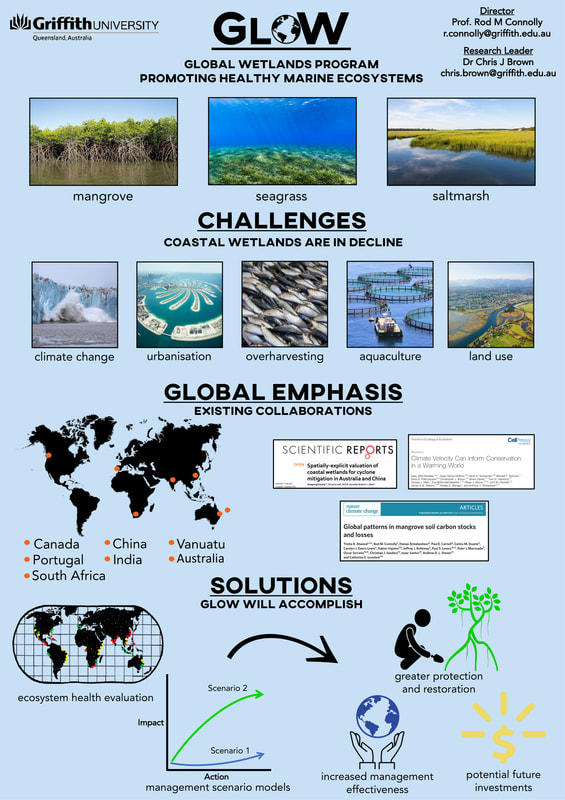New PhD opportunities to work on conserving the health of coastal wetlands
We are seeking PhD students to conduct research with the new Global Wetlands (GLoW) program at Griffith University.
The Global Wetlands program aims to promote the health of coastal wetlands globally. Wetlands studied include mangroves, seagrass and saltmarsh ecosystems.

This interdisciplinary program brings together staff working on coastal wetlands science, conservation planning, ecological modelling, machine learning and science communication. We have collaborators in seven countries.
Successful PhD applicants will receive $10,000 additional funds to support field work and collaborative travel.
The ideal student will be motivated to conduct research in one or more of the fields of: biodiversity conservation, field ecology, ecological modelling, biogeography or wetlands ecology.
Interested candidates should read the project descriptions below and contact the relevant staff member in the first instance. Please also read the guidelines for PhD applicants at the bottom of this page before contacting GLoW staff.
Applications are due 2nd October 2018.
PhD project opportunities
Promoting the resilience of coastal wetlands to land-based threats
This project will expand Dr Tulloch’s models of land-based stressors to coastal ecosystems. The student will use the models at a large scale to prioritise actions on land that can protect coastal wetlands.
Contact: Dr Viv Tulloch-McShane
Trade-offs among the coastal ecosystem services provided by wetlands
This study can involve modelling and/or field components to study synergies and trade-offs in the delivery of ecosystem services from coastal wetlands.
Contact: Dr Viv Tulloch-McShane
Global shifts in grazer functions under multiple stressors
This experimental study will aim to sample marine grazers from multiple locations internationally to understand functional responses of grazers to multiple stressors.
Contact: Ryan Pearson
Finding function among structure: developing and validating indicators of ecosystem health in coastal wetlands
Contact: Dr Michael Sievers
Habitat suitability models for prioritisation of global action in coastal wetlands
This project aims to model current and future habitat suitability of wetland plants and animals. Current records of species occurrence (macroinvertebrates, fish, etc) would be supplemented field surveys. Models will be used to generate predictions and maps of biodiversity response under various scenarios, and to prioritise cost-effective management actions that promote the health of coastal wetlands.
Contact: Michael Sievers
Validating multi-stressor null models on coastal seagrass habitats
Marine systems are under increasing threat from a number of human activities. This project will aim to use a combination of field and experimental studies to quantify the types of interactions found between a range of stressors impacting seagrass habitats. These findings can help improve and inform management practices for conservation.
Contact: Mischa Turschwell
Automation of environmental monitoring
Environmental monitoring is on the brink of a step change in effectiveness. Building on GLOW’s automated fish identification system, the student will use ecological and statistical frameworks to determine how best to automate the gathering, quality assurance, and analysis, of environmental data.
Contact: Professor Rod Connolly
Mapping the world’s mangrove ecosystem services
Mangroves are one of the most valuable ecosystems on Earth, providing us with a range of services including carbon sequestration, coastal protection, fisheries, and water quality improvement. The ultimate goal of the project is to develop a global map of ecosystem services of mangrove which could aid in the better management, conservation, and restoration of these valuable ecosystems.
Contact: Dr Fernanda Adame
Criteria for potential PhD applicants
Please do not contact us unless you meet the below criteria. We will not be considering students for applications that do not meet these criteria. Further details on Griffith University’s application process can be found here.
Australian students
Australian citizens and permanent residents should have been awarded a 1st Class Honours degree or equivalent (e.g. Masters by research) in a relevant field. Ideally, they will also have published a lead authored paper in an internationally recognized peer-reviewed journal.
International students
International applicants must have been awarded a 1st Class Honours degree or equivalent (e.g. Masters by research) in a relevant field. They must be lead author on at least one publication in an internationally recognized peer-reviewed journal. To be considered, journals should be internationally recognized, for instance they should have an Impact Factor rating from ISI.